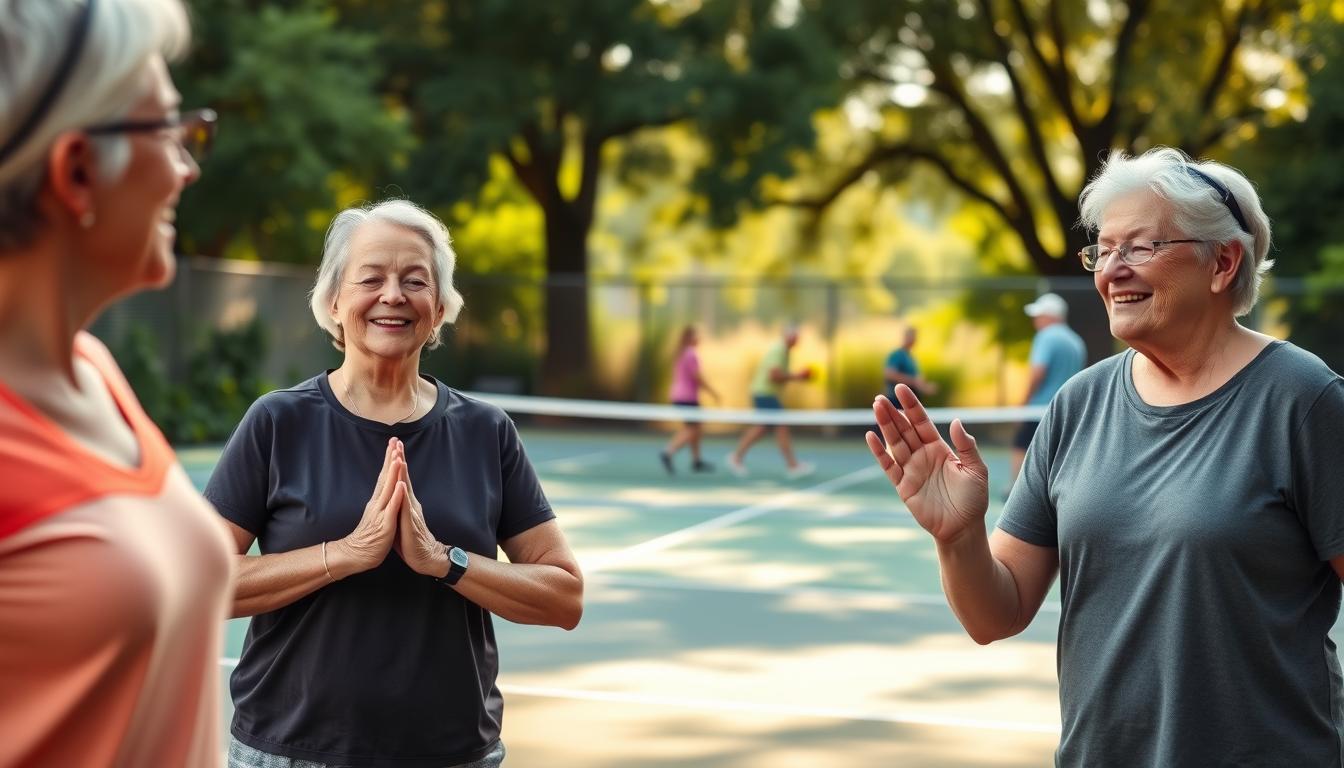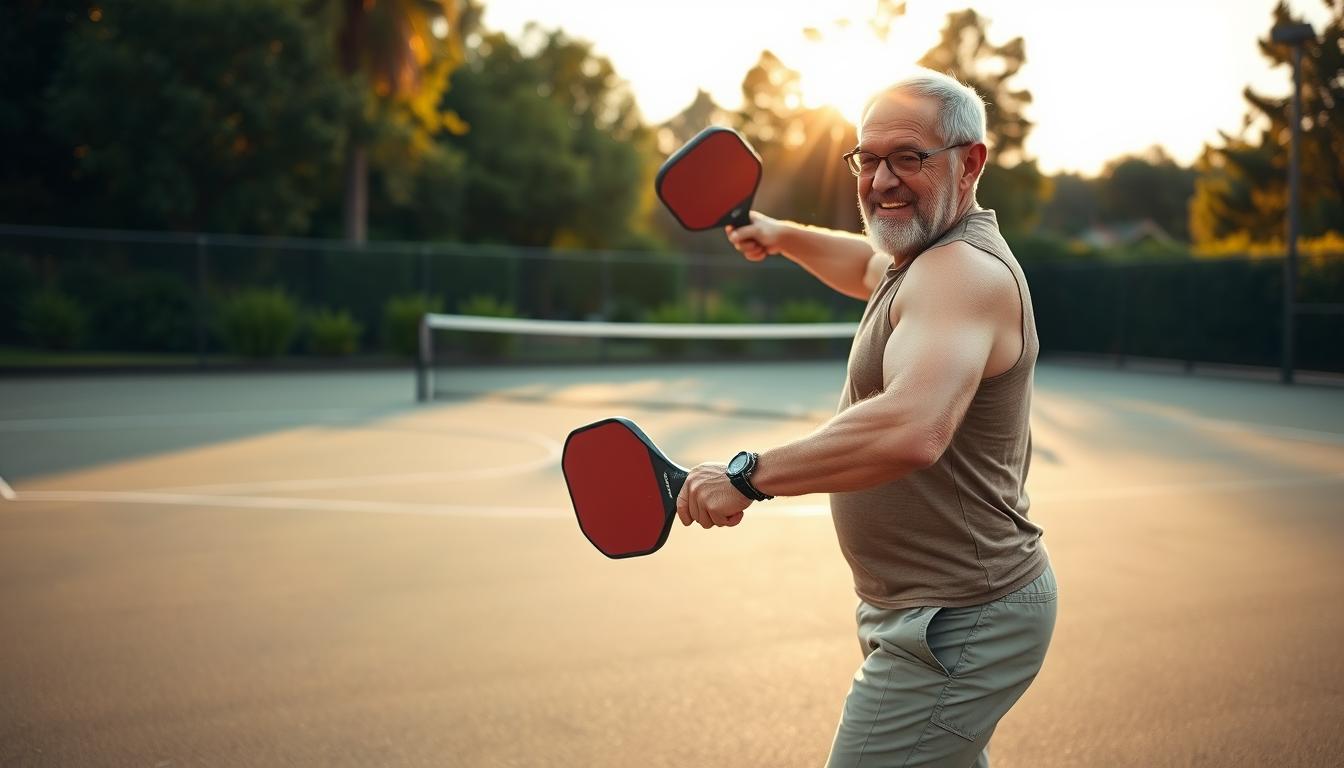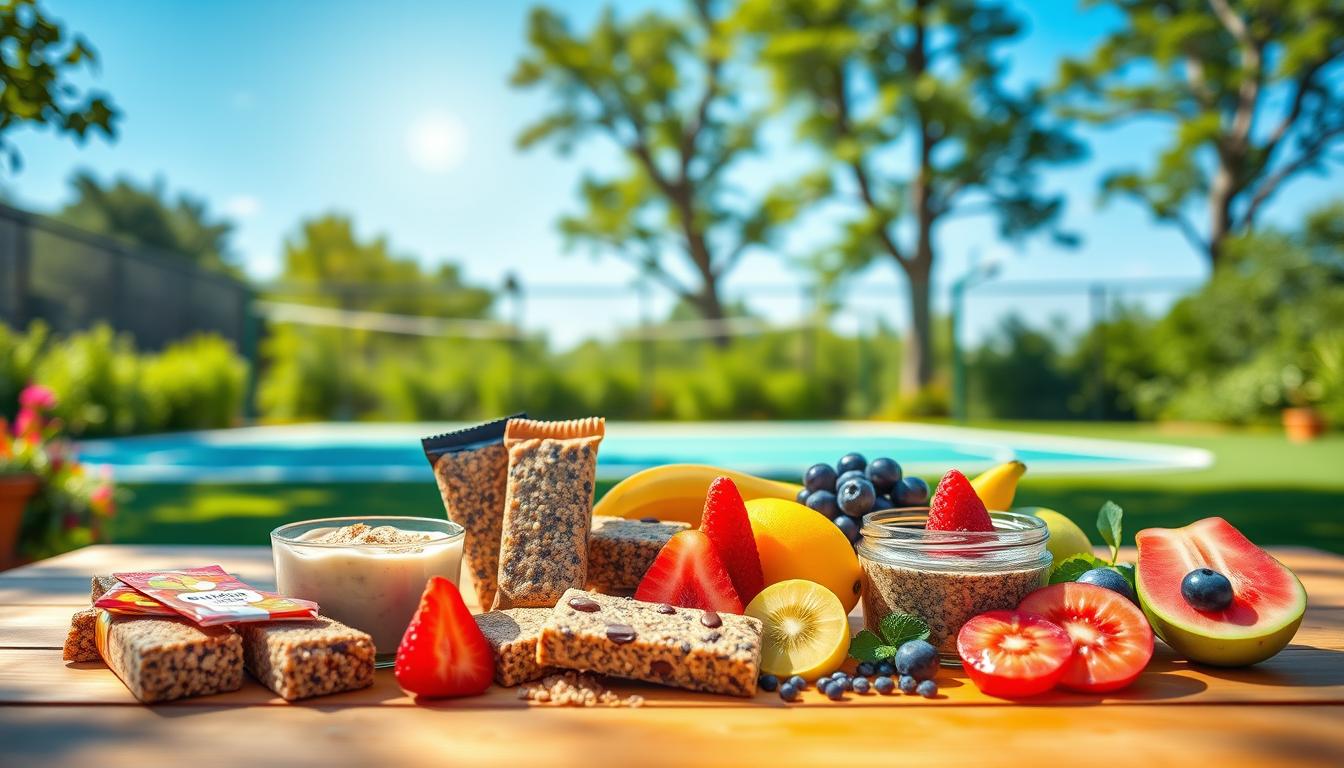Ever thought about how sleep affects your pickleball game as you get older? For those over 50, getting good sleep is key. It helps you recover from games and keeps you competitive with younger players. We’ll explore why sleep matters and share tips to improve your rest and game.
Why Sleep Is Crucial for Pickleball Recovery
Quality sleep is key for athletes, especially pickleball players. It’s essential for top performance, affecting both body and mind. Deep sleep helps muscles heal, skills improve, and energy comes back.
Not getting enough sleep can cause big problems. It can slow down reaction times and hurt decision-making. It also affects emotions, making it harder to stay focused and strong during games.
The Benefits of Sleep for Athletes Over 50
For older athletes, quality sleep is key to better athletic performance. As we age, our bodies need more time to recover. Good sleep helps muscles heal faster, which is vital for staying in top shape.
Studies show that enough sleep boosts brain power. This means older athletes can make quicker decisions and move more smoothly. They become more agile and sharp, which helps in strategic gameplay.
Emotional control is also crucial in sports, especially when the stakes are high. Sleep helps manage mood and stress. This way, older athletes stay calm and focused, leading to better performance.
| Sleep Benefits | Impact on Older Athletes |
|---|---|
| Improved Muscle Recovery | Faster healing and less fatigue |
| Enhanced Cognitive Function | Better decision-making and coordination |
| Emotional Stability | Reduced stress and improved focus |
| Overall Athletic Performance | Increased competitive edge and resilience |
How Much Sleep Do Older Pickleball Players Need?
Older athletes need 7 to 9 hours of sleep each night. Activities like pickleball make rest even more important. Athletes often find 8 to 10 hours helps them recover best.
Longer sleep helps the body repair and grow. It’s key for keeping up performance and avoiding injuries. Without enough sleep, athletes may feel tired and struggle to play well.
For those playing many matches or facing tough conditions, good sleep is crucial. It helps in recovering from games and improving performance. Making sleep a priority can lead to better results on the court.
The Role of Deep Sleep in Recovery
Deep sleep is key for physical recovery in pickleball players, especially those over 50. It’s when the body releases growth hormone, vital for muscle repair and tissue growth. As players get older, they need better recovery methods.
Deep sleep boosts athletic performance by improving physical and mental functions. It helps with muscle repair and enhances memory and reaction time. Without enough deep sleep, athletes may see a drop in performance.
To improve recovery, athletes should focus on getting good sleep. They can do this by creating a sleep-friendly environment and following healthy bedtime routines. This way, they can get the deep sleep needed for better recovery and performance.
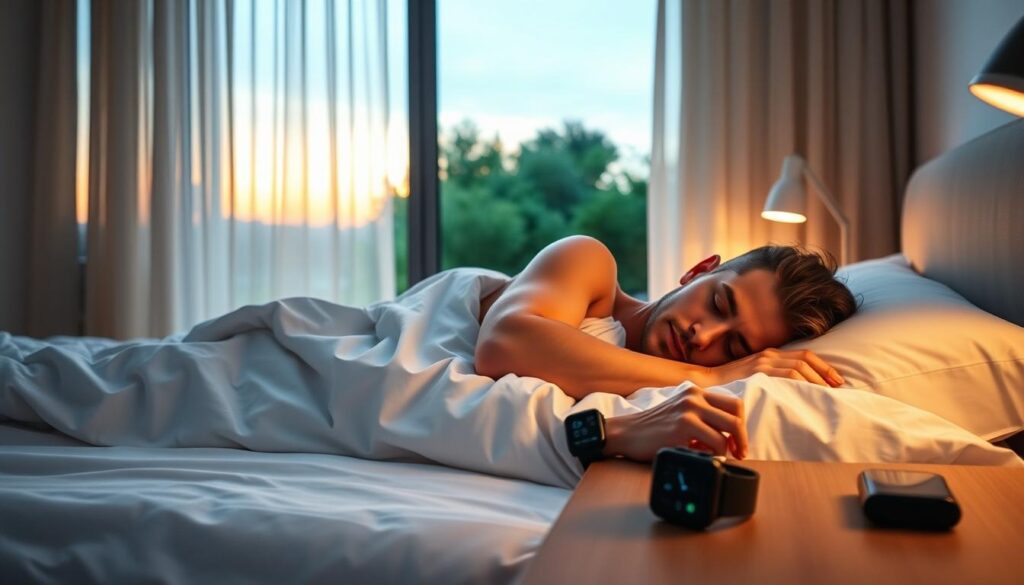
The Connection Between Sleep and Reaction Time
Sleep is key for athletes, especially older ones in high-energy sports like pickleball. Not getting enough sleep hurts health and reaction times. Studies show that poor sleep makes it hard for athletes to react fast in games.
This shows a clear link between sleep and sports performance. In fast games like pickleball, quick thinking is crucial. Good sleep boosts mental alertness, helping players stay sharp on the court. Getting enough sleep can make athletes react faster in games.
To win, athletes need to focus on sleep quality. Better sleep habits can improve thinking and agility. This can be the game-changer in sports.
Sleep Optimization for Older Athletes
For older athletes, understanding sleep is key to better performance and recovery. Good sleep boosts physical health and athletic skills. Knowing about sleep cycles is crucial for quality rest.
Each cycle, including light, deep, and REM sleep, has its own role. They help with recovery and overall health.
Understanding Sleep Cycles
Sleep cycles last about 90 minutes and happen several times a night. They usually range from four to six cycles. Light sleep gets the body ready for deeper stages.
Deep sleep helps with physical recovery. REM sleep boosts brain functions, important for strategy and decision-making in sports like pickleball. Knowing about these stages helps athletes sleep better and perform better.
Best Practices for Quality Sleep
Good sleep hygiene is important for quality sleep. Older athletes should follow these tips:
- Stick to a regular sleep schedule, going to bed and waking up at the same times every day.
- Avoid blue light from screens at least an hour before bedtime.
- Make your sleep area quiet, dark, and cool.
- Don’t have too much caffeine or alcohol close to bedtime.
These simple steps can improve sleep cycles and recovery. This leads to better athletic performance.
Building a Sleep Routine for Peak Performance
Creating a consistent sleep routine is key for pickleball players over 50 to reach their best. A good routine helps the body recover better. It makes it easier to fall asleep and wake up refreshed.
Relaxing before bed is important for good sleep. Activities like stretching, reading, or meditation tell your body it’s time to relax. Avoiding screens and stimulating activities an hour before bed helps you sleep better.
These habits lead to better sleep and performance on the court. Being consistent is crucial. Regular patterns help you sleep deeper and more restfully.
How Strategic Naps Can Enhance Recovery
Napping is a great way to boost recovery, especially for those who can’t get enough sleep at night. It offers many benefits, making it key for athletes aiming for top performance.
Optimal Timing for Naps
The best time for naps is between 12:30 PM and 4:30 PM. This is when our energy naturally drops. A 20 to 30-minute nap can make us feel more alert and sharp, without feeling too sleepy afterwards.
Short vs. Long Naps: What’s Better?
Short naps give quick benefits, helping us feel better right away. They don’t leave us feeling groggy. Long naps, however, offer deeper sleep, which can help more in recovery. It’s important to find the right nap length for your needs, to get the most out of napping for better recovery and performance.
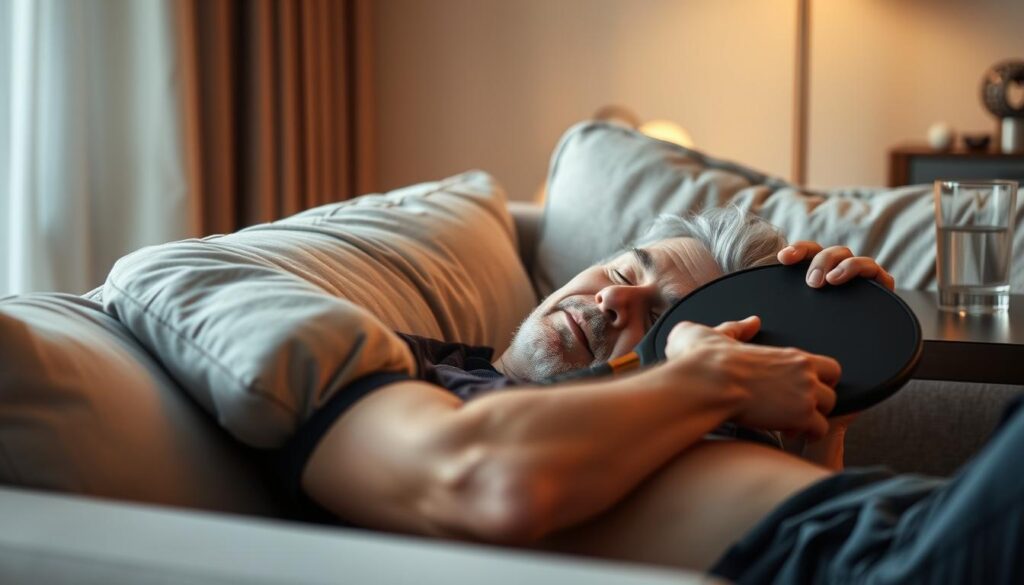
Signs Your Sleep Quality May Be Affecting Your Game
For athletes playing pickleball, knowing about sleep quality signs is key to staying at the top. Poor sleep shows up in many ways that can affect how well you play. Some common signs include:
- Waking up feeling fatigued
- Reduced energy levels during matches
- Difficulty concentrating on the court
- Slower reaction times to opponents
These signs are important to watch for if you want to get better at your game. Not paying attention to these can make your performance worse. It’s crucial for athletes to check their sleep habits often. Even small changes can make a big difference.
If you keep having trouble sleeping, talk to a doctor. They can help find out if you have a sleep disorder that’s affecting your game.
Using Technology to Track Sleep Patterns
Technology has changed how athletes track their recovery. Smartwatches and fitness bands give insights into sleep quality and how long they sleep. These devices record many metrics, showing sleep cycles and any disturbances.
Performance analytics from sleep patterns help athletes adjust their training. They can see how sleep affects their performance. This data helps them make better decisions about training and recovery.
But, athletes should also focus on healthy sleep habits. Too much focus on tracking data can cause stress. This stress can undo the good of recovery technology. It’s important to find a balance between using technology and keeping a regular sleep routine.
Natural Ways to Enhance Sleep Quality
Improving sleep quality is key for athletes over 50. Natural sleep aids like valerian root and melatonin supplements can help. They make it easier to get deep, restful sleep.
Creating a calm pre-sleep routine is also important. Light stretches or breathing exercises can help relax your mind and body. This makes it easier to fall asleep.
Keeping your sleep environment comfortable is crucial too. Use soft bedding and keep your bedroom dark and quiet. A good sleep space helps you relax and recover better.
Building sleep-promoting habits is essential. Going to bed and waking up at the same time helps your body’s clock. This leads to better sleep and recovery for athletes.
Conclusion
For athletes over 50, getting enough sleep is key after playing pickleball. Good sleep boosts athletic performance. It helps older players recover better and play better.
Understanding sleep’s benefits and following good sleep habits is important. This lets older athletes track their sleep and make changes. It helps with physical recovery and keeps the mind sharp during games.
In short, making sleep a priority is vital for better health and sports skills. By following these tips, you can play pickleball at your best. This makes every game more fun and competitive.
FAQ
How does sleep impact athletic performance for pickleball players over 50?
Sleep is key for muscle repair and brain function. It helps with decision-making and emotional control. These are vital for pickleball success.
What are the recommended hours of sleep for older athletes?
Older adults need 7 to 9 hours of sleep each night. Athletes might need 8 to 10 hours for full recovery and performance.
Why is deep sleep important for recovery?
Deep sleep is crucial for physical repair. It’s when the body releases growth hormone. This hormone helps fix muscles and tissues, boosting recovery.
Can inadequate sleep affect reaction times in pickleball?
Yes, not enough sleep makes reaction times slower. This can hurt an athlete’s quickness on the court, affecting their game.
What are some effective strategies for improving sleep quality?
Good sleep habits include regular sleep times and avoiding blue light. A comfy sleep space also helps improve sleep quality for athletes.
How can I establish a sleep routine to improve my athletic performance?
Stick to a bedtime and wake-up schedule. Avoid exciting activities before bed. Relaxing before sleep also helps improve your game.
What is the optimal time for napping for recovery?
Nap best between 12:30 PM and 4:30 PM. Short naps of 20 to 30 minutes boost alertness. Longer naps offer deeper recovery but might make you feel groggy.
What signs indicate that my sleep quality may be affecting my pickleball game?
Look out for waking up tired, low energy, and trouble focusing. Slower reaction times are also a sign. These can mean you need better sleep.
How can technology help me monitor my sleep patterns?
Wearables and apps track sleep. They help see recovery trends and adjust training. But, healthy sleep habits are more important than tracking data.
Are there natural methods to enhance sleep quality?
Yes, valerian root and melatonin can help sleep. A calming bedtime routine and a cozy sleep space are also key for better rest.


